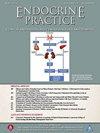Optimal Use of Once-Weekly Basal Insulin Efsitora Alfa in Type 1 and Type 2 Diabetes: A Systematic Review and Meta-Analysis
IF 4.6
3区 医学
Q2 ENDOCRINOLOGY & METABOLISM
引用次数: 0
Abstract
Objective
No meta-analysis has holistically analyzed and summarized the efficacy and safety of the novel once-weekly basal insulin efsitora alfa in managing type 1 diabetes (T1D) and type 2 diabetes (T2D).
Methods
Clinical trials involving subjects with T1D and T2D receiving once-weekly efsitora alfa in the intervention arm and once-daily basal insulins in the control arm were searched throughout the electronic databases. The primary outcome assessed was the change from baseline in glycated hemoglobin (HbA1c).
Results
Data from 6 studies (2465 subjects) were analyzed (follow-up 26-54 weeks). Once-weekly efsitora alfa and once-daily degludec achieved comparable HbA1c reduction in study subjects with T2D (mean difference [MD] 0.02% [−0.11, 0.16]; P = .74) and T1D (MD 0.11% [−0.01, 0.22]; P = .08). Efsitora and degludec were similarly effective in reducing fasting plasma glucose and achieving HbA1c < 7% in subjects with T2D. Individuals with T2D and T1D in the 2 groups had comparable time in range, time above range, and time below range. Subjects with T2D receiving efsitora and once-daily basal insulin had comparable total adverse events, severe adverse events, injection-site reactions, hypersensitivity events, and overall and severe hypoglycemia; however, nocturnal hypoglycemia risk was lower with efsitora (risk ratio 0.85 [0.74, 0.98]; P = .03). However, in individuals with T1D, total adverse events, severe adverse events, and injection-site reactions were higher with efsitora, with comparable risks of hypersensitivity events and overall, severe and nocturnal hypoglycemia.
Conclusion
Once-weekly basal insulin efsitora alfa is well tolerated with glycemic efficacy similar to once-daily degludec.
1型和2型糖尿病患者最佳使用每周一次基础胰岛素:一项系统回顾和荟萃分析。
目的:目前还没有meta分析全面分析和总结新型每周一次基础胰岛素治疗1型糖尿病(T1D)和2型糖尿病(T2D)的有效性和安全性。方法:在电子数据库中检索T1D和T2D患者的临床试验,干预组每周接受一次efsitora α,对照组每天接受一次基础胰岛素治疗。评估的主要结局是HbA1c从基线的变化。结果:分析了6项研究(2465名受试者)的数据(随访26-54周)。在患有T2D的研究对象中,每周一次的降糖素和每天一次的降糖素取得了相当的HbA1c降低效果(平均差[MD] 0.02% [-0.11, 0.16];P = 0.74)和T1D (MD 0.11% [-0.01, 0.22];P = 0.08)。Efsitora和degludec在降低空腹血糖和达到HbA1c方面的效果相似。结论:每周一次的基础胰岛素Efsitora alfa耐受性良好,降糖效果与每日一次的degludec相似。
本文章由计算机程序翻译,如有差异,请以英文原文为准。
求助全文
约1分钟内获得全文
求助全文
来源期刊

Endocrine Practice
ENDOCRINOLOGY & METABOLISM-
CiteScore
7.60
自引率
2.40%
发文量
546
审稿时长
41 days
期刊介绍:
Endocrine Practice (ISSN: 1530-891X), a peer-reviewed journal published twelve times a year, is the official journal of the American Association of Clinical Endocrinologists (AACE). The primary mission of Endocrine Practice is to enhance the health care of patients with endocrine diseases through continuing education of practicing endocrinologists.
 求助内容:
求助内容: 应助结果提醒方式:
应助结果提醒方式:


